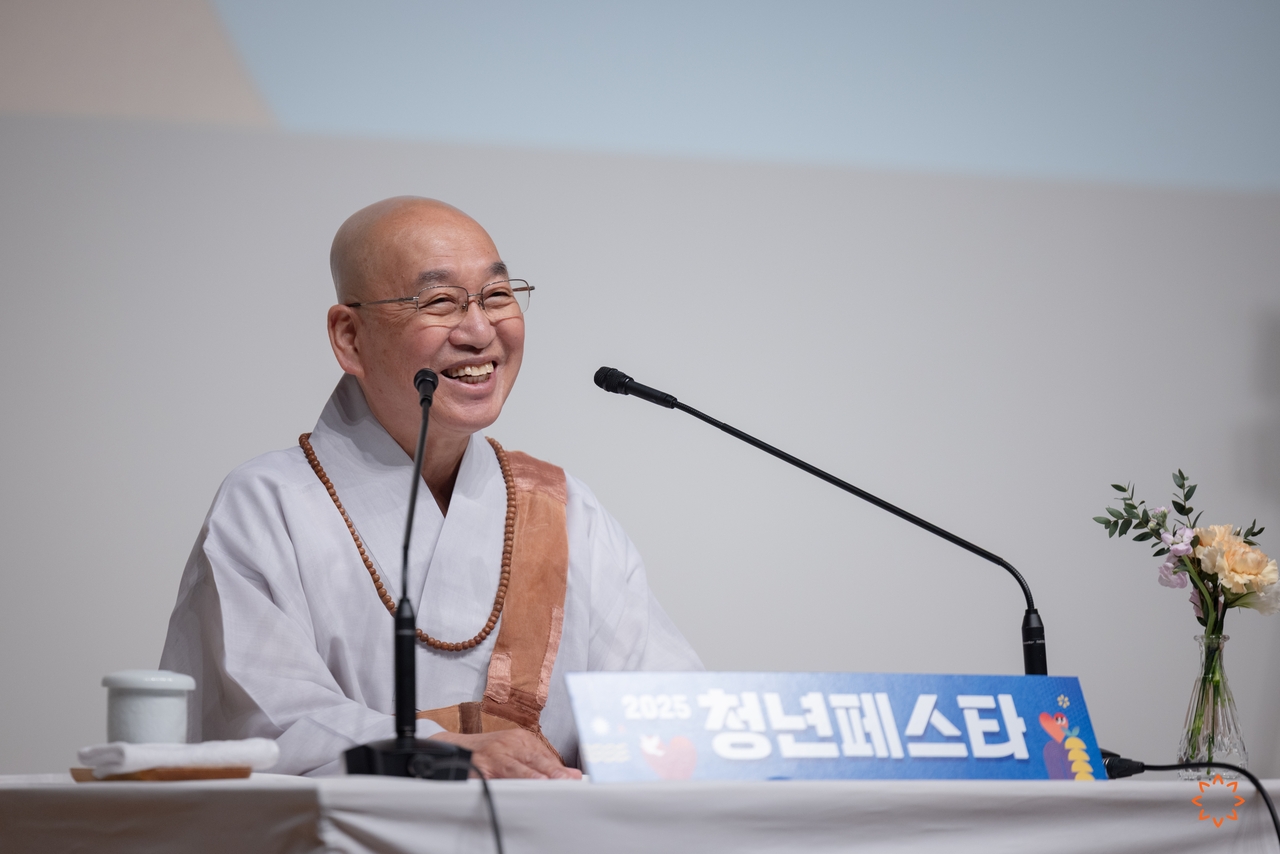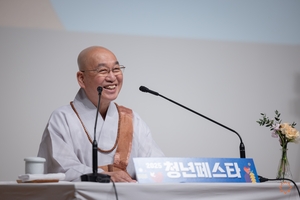Engaging in one conversation at a time, Buddhist monk helps ease concerns
 The Ven. Pomnyun takes part in a discussion under the theme of happiness on Friday, the first day of the Youth Festa held at Seoul Jungto Center. (Jungto Society)
The Ven. Pomnyun takes part in a discussion under the theme of happiness on Friday, the first day of the Youth Festa held at Seoul Jungto Center. (Jungto Society) The Ven. Pomnyun walked onstage to a rock beat Friday afternoon, moments after the singer Maya energized the opening of Youth Festa. Before hundreds of young people, he launched into his signature live dialogue — often mislabeled as an “instant Q&A.”
“I cannot trust my senses because I’m disabled. I kind of realized that I have to live differently from those without a disability, but I don’t know what to do next,” a person in the audience poses.
“I’m struggling in my relationship with my mother. My father passed away when I was young, and she has relied on me emotionally ever since. She has always been harsh with me, and while I know I should feel grateful and compassionate toward her, her constant negativity weighs heavily on me. How can I rebuild my relationship with her and find peace within myself?,” another participant asks.
These are among the several thousands of questions Pomnyun has received since 2011, when he began engaging in conversations with young people, after a series of suicides at the highly competitive Korea Advanced Institute of Science and Technology prompted him to engage in conversations with young people.
After a pause during the COVID-19 pandemic, his work has returned in a new frame: Youth Festa, a three-day event organized largely by young people, where guests have included actor Cho In-sung and comedian Kim Je-dong.
This is the Buddhist monk’s third appearance at the event. Previously, he held talks on themes of peace and future.
“It’s instant questions and instant conversations,” the Ven. Pomnyun, the leader of Jungto Society, told The Korea Herald after the first session Friday. “If the person asking realizes the issue isn’t actually a problem, that’s the best. The second best is that they find a way forward through the conversation.”
Jungto Society is a Buddhist civic organization Pomnyun founded in 1988 that focuses on applying Buddhist principles to real-world issues, promoting personal growth, social justice, environmental sustainability and humanitarian relief.
“Until 20 years ago, I had a lot to say to the world and about the world, but not anymore. These days, I don’t do lectures but only engage in instant questions and conversations. And through the conversations, those who asked the question find their own answers,” he said.
Pomnyun’s method is to flip perspectives rather than prescribe solutions.
For instance, on public indifference on many issues and the associated guilt that casts a long shadow, the 72-year-old offered a reframe: “Not doing good doesn’t make you bad.”
While he recognizes societal issues, he notes that these alone do not determine our happiness. We also need to examine our tendency to take what we have for granted and overlook its value, while idealizing what others have, he stressed.
“Korea has issues to fix — housing, education, low birth rate, high suicide rate and more. From the inside, life can feel suffocating, even ‘hellish,’ but from the outside, it can look very different. So while we must continue working to improve these social problems, we also need to recognize the strengths and advantages we already have,” he said.
For those trying to build a new life in Korea, he suggests a similar change of perspective.
“First, it may seem great for a short visit, but choosing to live here is a different story with real difficulties. Whether you come to study, work or settle for the long term, you need to be prepared. This country isn’t all upside,” he said.
“Second, when you transplant a tree, it takes three years for the roots to settle. During that time, the tree doesn’t grow — it merely survives. Only after its fine roots take hold can it begin to flourish again. Adapting to a new environment works much the same way: It takes years, not months.”
gypark@heraldcorp.com
